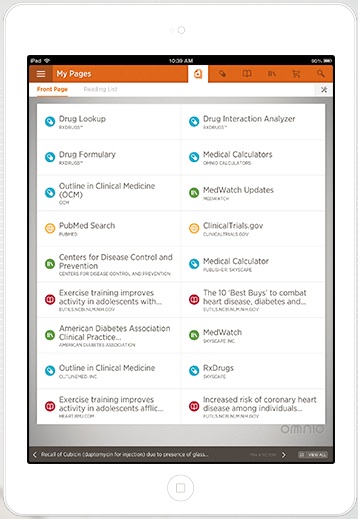 Physicians Interactive, the digital health marketing company that offers medical content readers Skyscape and Omnio, was acquired in August by Merck's Global Health Innovation Fund, which bought a controlling interest from former parent company Perseus LLC. Merck had previously invested $17 million in the company.
Physicians Interactive, the digital health marketing company that offers medical content readers Skyscape and Omnio, was acquired in August by Merck's Global Health Innovation Fund, which bought a controlling interest from former parent company Perseus LLC. Merck had previously invested $17 million in the company.
At Health 2.0 last week in Santa Clara, California, Chief Medical Officer and senior VP of product management Gautam Gulati told MobiHealthNews about what the acquisition means for the company and its iPad app Omnio.
Gulati said the new ownership would not necessitate a change in the direction for the company, but instead gives them access to a wide range of resources.
"Imagine having at your disposal access to some of the largest clients to be your pilot for anything new that you develop," he said. "What we basically were given at the table was a suite of large scale companies willing to experiment with us in the future. On top of that, we were given a platform within their portfolio too. We've just gone from a small piece in the marketplace to something that's going to have a substantial presence, given the fact that we have the ability to collaborate with all these other portfolio companies."
Physicians Interactive was bought out of Allscripts in 2007 and went on to acquire several smaller companies or develop in-house ventures in order to build a comprehensive content platform for doctors. Acquisitions included medication adherence app MedManage, medical content reader Skyscape, and patient engagement company Infomedics. The company launched an ad network in a joint venture with Remedy Systems, and created an EHR toolkit internally.
"At the end of the day what physicians are bombarded with is basically a kitchen sink of available experiences for them," Gulati said. "So we're just trying to help create and deliver value by merging all those experiences into one."
Skyscape is the base of an iPad app called Omnio, which Physicians Interactive launched in December. The free app functions similarly to an RSS reader, letting physicians digitally aggregate journals, news, medical alerts, textbooks, and reference materials into one stream. The app is free to physicians -- the company makes money through advertising.
"We're looking for smarter ways of delivering messaging and marketing services from our clients to our users," said Gulati. "The old ways of delivering banner ads and interruption marketing is behind us. We're sitting on tons of data. ... How do we make use of that data to deliver integrated content?"
The solution in the next release of Omnio, due out in November, is to look to Facebook for inspiration, allowing physician organizations, drug companies, and other paid clients to create "pages," which doctors can add to their feeds the same way they would a journal, news source, or news keyword.
Gulati said the company knows from years of user data from SkyScape and Omnio that, for instance, physicians tend to use the same information sources over and over again. Eighty percent of the content they access is old, he said, and they use on average about five calculator tools out of 600 available. Omnio allows the user to bookmark pages, calculators, or drug reference pages and keep them in folders for future access.
The content available is separated loosely into utility and leisure categories, so that tools doctors might need in a hurry can be accessed within 10 seconds, whereas news and journal content can be approached more slowly. The utility content is housed natively in the app, whereas leisure content is often accessed via the web.
Although it's currently available only on the iPad, Omnio has been downloaded 75,000 times according to Gulati. The company plans to release an iPhone and iPod touch version early next year and an Android version some time after that. The company is waiting for that cross-platform functionality to phase out SkyScape and replace it completely with Omnio. SkyScape, which has been around since 1998, currently runs on not just iOS and Android devices, but also Blackberry and Palm Pilot devices.
The next phase for the company, Gulati said, will be to continue to incorporate more relevant information into the app, including clinical information and "swivel" information for doctors to share with their patients at the point of care. He said this kind of integration is more likely to happen through partnerships than in-house development.
"Even if it's our competition, how do we allow them access into our network so ultimately we're delivering value to the provider and then to their patients?" Gulati asked. "We aren't a single product, a lot of people in the industry are approaching us and seeing us as a platform for multiple things."


















